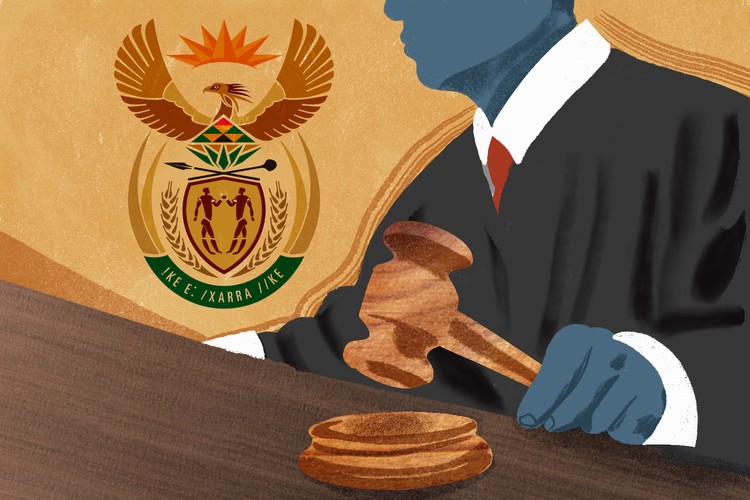
14 August 2023
No judge has yet been removed from office in post-apartheid South Africa. Illustration: Lisa Nelson
It has been 16 years since allegations emerged that on the morning of 6 January 2007 Gauteng High Court Judge Nkola Motata drove his car into a wall while drunk.
Following his drunk-driving conviction in a magistrates court, a judicial misconduct complaint filed with the Judicial Service Commission (JSC) added allegations that Judge Motata was dishonest in his defence against the drunk-driving charge and had used racist language.
In April 2018, after years of delay due to litigation, a Judicial Conduct Tribunal confirmed the allegations and found Judge Motata guilty of gross judicial misconduct, and recommended impeachment.
A majority of the JSC subsequently confirmed that Judge Motata was guilty of gross misconduct but substituted the impeachment finding with a R1-million fine.
Freedom Under Law took the JSC’s decision on review in the Gauteng High Court but were unsuccessful.
In a scathing judgment in June 2023, the Supreme Court of Appeal reversed the Gauteng High Court’s judgment which had dismissed Freedom Under Law’s review.
The SCA harshly criticised the JSC for how it handled the Judge Motata complaint, including the bizarre reasons it used to disregard some of the Tribunal findings and its imposition of a lesser punishment on Motata.
The SCA ordered that the Motata case be sent back to the JSC for the body to write to the Speaker of the National Assembly, recommending Judge Motata’s impeachment.
According to News24, the JSC has indicated that it will not be appealing the SCA’s decision and will comply. This means that Chief Justice Raymond Zondo, as chairperson of the JSC, must now write a letter to the Speaker initiating the impeachment process.
This will be only the second time that the JSC recommends judicial impeachment.
The first time was for Judge President Hlophe, which Parliament has decided to place on hold pending ongoing litigation.
Section 177 of the Constitution provides for the impeachment of a judge, including removal from office. It sets out a three-stage process.
The section says a judge may be removed from office only if the Judicial Service Commission finds that the judge suffers from an incapacity, is grossly incompetent or is guilty of gross misconduct; and the National Assembly calls for that judge to be removed, by a resolution adopted with a supporting vote of at least two thirds of its members.
The President must remove a judge from office upon adoption of a resolution calling for that judge to be removed.
The Judicial Conduct Tribunal investigation together with the JSC’s finding of gross misconduct satisfy the first stage of the process.
It then moves to the second stage, which is the National Assembly calling for the judge’s removal through a two-thirds majority vote. In practice, according to Parliament’s Legal Services division, this means that the Speaker must send the Chief Justice’s letter, the tribunal report, the JSC’s finding, and the SCA judgment to the National Assembly Committee on Justice and Correctional Services, which must do background work before the National Assembly vote.
The Committee must confirm that the JSC has completed the first stage of the process in terms of section 177 of the Constitution, in that there is a finding of gross misconduct from the JSC. If there is such a finding (which there is), the Committee will then prepare a report for the National Assembly, with a recommendation that the JSC finding be subject to a vote on the removal of the judge from office.
Significantly, unlike the section 89 process to impeach the President, or the section 94 process to impeach the head of a Chapter 9 institution such as the Public Protector, Parliament has an extremely limited role in the impeachment of judges. It cannot re-open an inquiry into the guilt or otherwise of the judge – that process has already been undertaken and completed by the JSC. This was made clear in the John Hlophe v JSC judgment of the Gauteng High Court.
Upon receipt of the Committee’s report, the Speaker must then schedule a sitting of the National Assembly where a motion calling for the removal of the judge will be tabled. Members of Parliament may then debate the motion, with arguments for or against the removal of the judge from office. Following the debate, a vote will be taken.
If two-thirds of the National Assembly members (a minimum of 267 members) vote in favour of the motion, that will mean the motion passes and the judge must be removed from office.
The Speaker must then write a letter to the President confirming the National Assembly’s resolution. Similarly, if the motion fails to attract the two-thirds majority vote, it will mean that the judge will remain in office.
This might seem strange, but Parliament, through freely elected public representatives, plays a special role as the ultimate oversight authority over the exercise of all public power given by the Constitution. Through its political judgment, Parliament holds all public office bearers accountable and decides who may hold a constitutional office and who may not.
The vote on the motion to remove the judge will bring an end to the second part of the process.
The third and final stage, in terms of section 177 of the Constitution, is the President, based on the letter received from the Speaker, signing an official document called a presidential minute, confirming the date on which the judge is officially removed from office.
From that date onwards, the judge will lose the title and status of a judge, and the benefits that come with the office, including a salary of over R1-million for life, medical benefits and a car allowance.
It would mark the first time that a judge has been impeached, and bring to an end the longest judicial scandal in democratic South Africa.
Mbekezeli Benjamin is Research and Advocacy Officer at Judges Matter